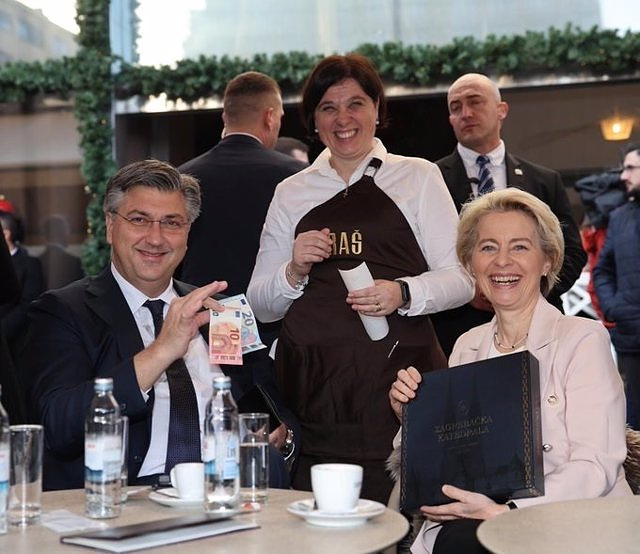MADRID, 1 Ene. (EUROPA PRESS) -
The President of the European Commission, Ursula von der Leyen, applauded this Sunday "the immense achievements" that have led to Croatia's incorporation into the eurozone and the Schengen area, made official this Sunday, as a moment of deepening its relations with the European bloc, both in general and on a daily basis among the communities that make it up.
"What a great success for the people of Croatia," Von der Leyen assured during her visit, accompanied by the Croatian Prime Minister, Andrej Plenkovic. "I know how hard you worked for this day to come," she told the president on a day of "joy and pride."
With the change from the kuna, hitherto the national currency, to the euro, Croatia becomes the 20th state to share a common currency. The last country to join the euro was Lithuania, in 2015.
Croatia had to comply with a series of fiscal and economic governance rules to adopt the single currency. The exchange rate will be 7.5345 kunas per euro, and the exchange will be free until the end of 2023 in all banks in the country.
Likewise, Von der Leyen has applauded that "the next generations of Croats will grow up in Schengen" and that "fluid travel will allow communities to remain more united."
"Now we have to work to preserve the benefits of Schengen. To improve our common home and make it an even safer place," he declared.
The last expansion of the Schengen area was in 2011, when Liechtenstein was included. With its incorporation, Croatian citizens will be able to move around the Schengen area without a passport.
Both the currency exchange and its inclusion in the Schengen area could mean a tourist 'boom' for Croatia, which attracts tourists for its beaches along the Adriatic coast and for the medieval city of Dubrovnik.
The removal of controls at the borders with Slovenia and Hungary and for ferries to Italy will also facilitate the arrival of tourists and business travelers. However, people who arrive in the country by plane will not benefit from the advantages of the Schengen area until March 26.

 Exploring Cardano: Inner Workings and Advantages of this Cryptocurrency
Exploring Cardano: Inner Workings and Advantages of this Cryptocurrency Seville.- Economy.- Innova.- STSA inaugurates its new painting and sealing hangar in San Pablo, for 18 million
Seville.- Economy.- Innova.- STSA inaugurates its new painting and sealing hangar in San Pablo, for 18 million Innova.- More than 300 volunteers join the Andalucía Compromiso Digital network in one month to facilitate access to ICT
Innova.- More than 300 volunteers join the Andalucía Compromiso Digital network in one month to facilitate access to ICT Innova.-AMP.- Ayesa acquires 51% of Sadiel, which will create new technological engineering products and expand markets
Innova.-AMP.- Ayesa acquires 51% of Sadiel, which will create new technological engineering products and expand markets Mañueco emphasizes that Spain does not want "a president in hiding" and "surrounded by justice"
Mañueco emphasizes that Spain does not want "a president in hiding" and "surrounded by justice" The 'number three' of the PSOE, Santos Cerdán, will appear this week in the Senate commission of the Koldo case
The 'number three' of the PSOE, Santos Cerdán, will appear this week in the Senate commission of the Koldo case The 'Freedom Flotilla' denounces Israel's "sabotage" of its mission and asks for support and dissemination
The 'Freedom Flotilla' denounces Israel's "sabotage" of its mission and asks for support and dissemination 12M.- Díaz: "I ask Mr. Feijóo to stop laminating the politics of our country"
12M.- Díaz: "I ask Mr. Feijóo to stop laminating the politics of our country" How Blockchain in being used to shape the future
How Blockchain in being used to shape the future Not just BTC and ETH: Here Are Some More Interesting Coins Worth Focusing on
Not just BTC and ETH: Here Are Some More Interesting Coins Worth Focusing on UPV students build a prototype of a wooden house to move to Equatorial Guinea
UPV students build a prototype of a wooden house to move to Equatorial Guinea The UA opens the call for the Impulso 2024 Awards for the best innovative business initiatives
The UA opens the call for the Impulso 2024 Awards for the best innovative business initiatives ALI, virtual assistant from Alicante, internationally recognized by the OECD
ALI, virtual assistant from Alicante, internationally recognized by the OECD Retrópolis brings the golden age of video games and computing to the UPV
Retrópolis brings the golden age of video games and computing to the UPV A million people demonstrate in France against Macron's pension reform
A million people demonstrate in France against Macron's pension reform Russia launches several missiles against "critical infrastructure" in the city of Zaporizhia
Russia launches several missiles against "critical infrastructure" in the city of Zaporizhia A "procession" remembers the dead of the Calabria shipwreck as bodies continue to wash up on the shore
A "procession" remembers the dead of the Calabria shipwreck as bodies continue to wash up on the shore Prison sentences handed down for three prominent Hong Kong pro-democracy activists
Prison sentences handed down for three prominent Hong Kong pro-democracy activists ETH continues to leave trading platforms, Ethereum balance on exchanges lowest in 3 years
ETH continues to leave trading platforms, Ethereum balance on exchanges lowest in 3 years Investors invest $450 million in Consensys, Ethereum incubator now valued at $7 billion
Investors invest $450 million in Consensys, Ethereum incubator now valued at $7 billion Alchemy Integrates Ethereum L2 Product Starknet to Enhance Web3 Scalability at a Price 100x Lower Than L1 Fees
Alchemy Integrates Ethereum L2 Product Starknet to Enhance Web3 Scalability at a Price 100x Lower Than L1 Fees Mining Report: Bitcoin's Electricity Consumption Declines by 25% in Q1 2022
Mining Report: Bitcoin's Electricity Consumption Declines by 25% in Q1 2022 Oil-to-Bitcoin Mining Firm Crusoe Energy Systems Raised $505 Million
Oil-to-Bitcoin Mining Firm Crusoe Energy Systems Raised $505 Million Microbt reveals the latest Bitcoin mining rigs -- Machines produce up to 126 TH/s with custom 5nm chip design
Microbt reveals the latest Bitcoin mining rigs -- Machines produce up to 126 TH/s with custom 5nm chip design Bitcoin's Mining Difficulty Hits a Lifetime High, With More Than 90% of BTC Supply Issued
Bitcoin's Mining Difficulty Hits a Lifetime High, With More Than 90% of BTC Supply Issued The Biggest Movers are Near, EOS, and RUNE during Friday's Selloff
The Biggest Movers are Near, EOS, and RUNE during Friday's Selloff Global Markets Spooked by a Hawkish Fed and Covid, Stocks and Crypto Gain After Musk Buys Twitter
Global Markets Spooked by a Hawkish Fed and Covid, Stocks and Crypto Gain After Musk Buys Twitter Bitso to offset carbon emissions from the Trading Platform's ERC20, ETH, and BTC Transactions
Bitso to offset carbon emissions from the Trading Platform's ERC20, ETH, and BTC Transactions Draftkings Announces 2022 College Hoops NFT Selection for March Madness
Draftkings Announces 2022 College Hoops NFT Selection for March Madness























